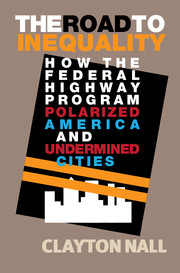Book contents
- Frontmatter
- Dedication
- Contents
- List of Figures
- List of Tables
- Guide to Abbreviations
- Acknowledgements
- 1 Introduction
- 2 How Highways Facilitate Partisan Geographic Sorting
- 3 Highways Polarize Metropolitan Political Geography
- 4 Transportation Becomes a Partisan Issue
- 5 Implications for Transportation Policy Making
- 6 Conclusion
- Bibliography
- Index
4 - Transportation Becomes a Partisan Issue
Published online by Cambridge University Press: 19 March 2018
- Frontmatter
- Dedication
- Contents
- List of Figures
- List of Tables
- Guide to Abbreviations
- Acknowledgements
- 1 Introduction
- 2 How Highways Facilitate Partisan Geographic Sorting
- 3 Highways Polarize Metropolitan Political Geography
- 4 Transportation Becomes a Partisan Issue
- 5 Implications for Transportation Policy Making
- 6 Conclusion
- Bibliography
- Index
Summary
Highways have contributed tor the geographic polarization of American partisans for the last fifty years. Up to this point, I have not delved into how geographic polarization matters for specific political and policy outcomes. Past work has suggested that migration into the suburbs and the associated suburban context drove suburban Americans to adopt more conservative policy attitudes tied to their material interests as suburbanites and their experience in the suburban social milieu (Gainsborough, 2001). Without seeking to resolve longstanding and unresolved debates over the nature of contextual and neighborhood effects, we can establish the degree to which partisanship (whatever its foundations) has become more strongly tied to policy attitudes, and how this has taken on distinctly geographic character. While urban–suburban polarization is likely to have consequences in numerous political domains, I focus on a public opinion topic germane to the idea of “policy feedback” implied in past scholarship: that highways have created locally focused issue publics that support specifically urban and suburban policies. Transportation policy itself seems most likely to lend itself to interest-based explanations for policy attitudes. We might expect support for different transportation policies to be associated with residence in a city, suburban, or rural area, and for place of residence to matter as much to opinions on these policy matters as their partisanship or ideology. However, this traditional view becomes more difficult to substantiate as partisan geographic polarization increases and Democrat and Republican political elites adopt more polarized rhetoric around transportation policy.
To address the changing roles of partisan attitudes and economic interest in transportation policy attitudes, I assembled historical survey data and collected original surveys measuring support for policies related to highways and mass transit, the two general categories of programs widely seen as competing transportation policy alternatives. These two issues have been marked by disagreement along the urban–rural divide and by partisanship, with mostly suburban and rural Republican voters endorsing highway spending to the exclusion of mass transit and other, nonhighway urban transportation investments (Grunwald, 2015; MacGillis, 2016).
- Type
- Chapter
- Information
- The Road to InequalityHow the Federal Highway Program Polarized America and Undermined Cities, pp. 70 - 106Publisher: Cambridge University PressPrint publication year: 2018



